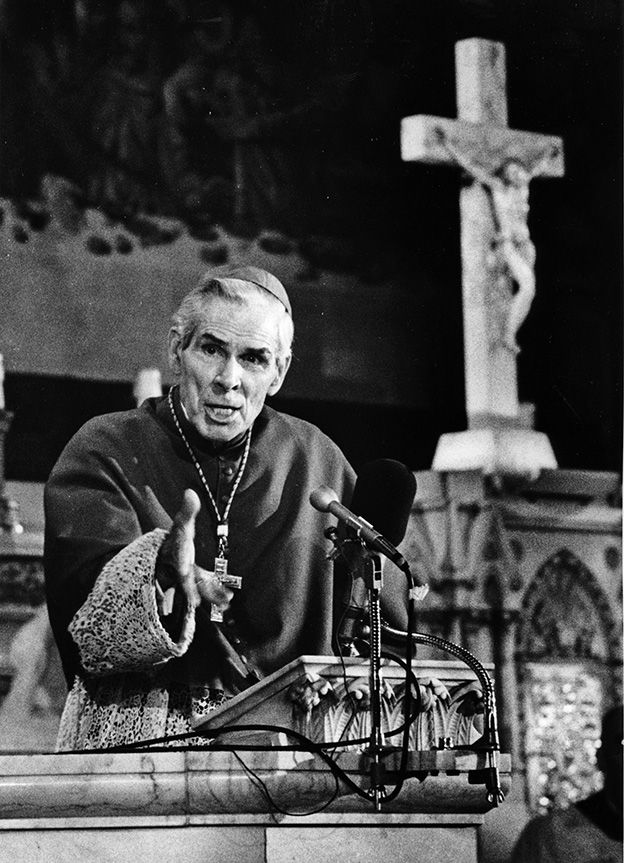Say the word “televangelist” in a crowded room and you might just as well have yelled “shark” at the beach. The word didn’t always evoke such a near universal response of disdain … until Fulton Sheen.
When it comes to televangelism, Sheen was pure lightning in a bottle. There were few people who followed him who could master his ability to convey the message of the Gospel via the medium of television.
Actually, people have been using whatever medium has been available to them for 2,000 years, whether it was the street, the printing press, radio or broadcast television. The casualty list of men and women who preceded and have followed Archbishop Fulton Sheen is long and represents many a cautionary tale.
The lack of a pop culture televangelist equal (with maybe one or two exceptions) to Fulton Sheen is equal parts the archbishop’s unique and exemplary gifts and the shortcomings of his rivals.
There is a third component as well, which is the difficulty the medium of television presents in promoting a gospel that is not always photogenic or doesn’t contain content television craves, such as talking down to audiences conditioned to desire the mundane and the nefarious.
With the notable exception of Billy Graham, who harnessed the power of television in a profound way similar to Fulton Sheen’s pull, most other televangelist attempts by Protestant and Catholic preachers have failed. Yet Fulton Sheen didn’t invent electronic evangelism. He wasn’t even the first priest media star. That mantle belonged to radio legend Father Charles Coughlin, whose regular radio broadcasts in Depression-era America were spellbinding.
Father Coughlin’s radio show reached an audience of 30 million people, and when you consider America’s total population in 1932 was 124 million, that’s an impressive number indeed.
Unlike Sheen, Father Coughlin was a fire breather, reaching his zenith in popularity in the years just before the outbreak of World War II. But his championing the cause of the poor in light of the economic disaster of the Great Depression was eventually overshadowed by his increasing anti-Semitism and lack of disdain for National Socialism.
His nadir was achieved when his more controversial remarks were being defended by officials inside Nazi Germany … exit Father Coughlin.
Just as Babe Ruth is credited with saving baseball after the 1919 Black Sox gambling scandal, Fulton Sheen did much to erase the negative legacy of Father Coughlin — replacing fire breathing with the deep ember-rich burning of love for Christ and for others.
And as television is wont to do, imitations of Fulton Sheen began to pop up everywhere well after Fulton Sheen stepped aside from public view. Unfortunately, the vacuum was filled by bombast, charlatans and sincere men and women with dubious theological premises.
The television airwaves in the aftermath of Fulton Sheen were rife with faith healers, prosperity Gospel proponents and mainstream and not-so-mainstream variations of Protestantism. Some of these programs basically consisted of big haired preachers pleading for a half hour for people to send in donations so they could stay on the air next week — week after week.
I’m sure there were many well-intentioned people engaged in this television evangelism who did a lot of good as well. But the scandal-ridden litany of preachers who had their dirty laundry replayed over the air in a never-ending spin cycle has condemned the very word of televangelist to the linguistic junk pile. It makes one wonder whether, in the end, the faith really is ready for its close-up.
Imagine what a television producer might have advised Jesus when word got out that he was about to preach on the real presence. In first century Judea, the public opinion on that teaching was made very clear.
A lot of people voted with their feet because Jesus told them something they didn’t understand or didn’t want to understand. When Jesus told the rich man how to get to heaven, he didn’t like what Jesus told him either, and Jesus’ ratings with that guy certainly nose-dived.
Television is a medium for the masses and one fueled by star power. To walk that razor’s edge of television star and remain a humble evangelist was something in which Fulton Sheen excelled.
He never seemed to believe his own publicity, even while so many others were consumed by it. The Bible raises plenty of red flags against this. I’m sure King David’s “ratings” with the people of Israel helped influence his descent on the hubris highway.
But precisely because television is a medium of the masses, we should not discount it as a tool to spread the Gospel. You can “preach” through art and drama and comedy.
But you can preach by preaching as well. After a very long hiatus, mainstream and popular Catholic televangelism made a comeback with Mother Angelica’s Eternal Word Television Network (EWTN). Through its charismatic foundress, this network has firmly established a Catholic voice, even if they do a lot of broadcasting to a built-in audience already primed to hear the message.
The trick is to deliver the same message to a tougher crowd. We pray for the poor souls of purgatory; maybe we can pray that the next Fulton Sheen is in a seminary somewhere, just waiting to rescue the word “televangelist” from the purgatory in which it currently resides.

